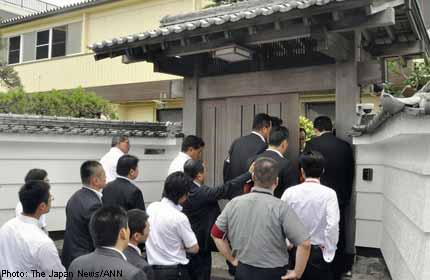
JAPAN - Police have arrested five senior members of the largest criminal organisation in Kyushu on suspicion of commiting fraud by concealing their identities as yakuza members to play golf, violating a business clause that prohibits members of such organisations from receiving private-sector services.
The Fukuoka prefectural police and the Okinawa prefectural police, along with the Metropolitan Police Department, arrested on June 29 five members of Dojin-kai, a Kurume, Fukuoka Prefecture-based organisation, for violating the golf course's binding terms and conditions that prohibit gang members.
Police began using the clause in 2009 to crack down on yakuza members and had taken action in 24 cases as of last year, expanding the campaign against criminal elements to golf courses, where they often socialize. In the first half of this year, the figure has already reached 11.
The binding terms and conditions of private-sector companies require clients to affirm that they have no ties with criminal organisations. If clients are found to have violated the rule, the companies can unconditionally nullify any contracts with such persons.
In June 2007, the government encouraged the private sector to introduce the terms as a means of fending off yakuza organisations. Since then, the movement has spread among golf courses, financial institutions, real estate companies and construction firms.
In a golf course on the main island of Okinawa famous for its ocean views, four people, including a woman, played golf in January, including Tetsuji Kobayashi, the 57-year-old head of Dojin-kai, which has 1,080 members and quasi members.
The reservation was made by a 42-year-old employee of a public organisation in Ginowan, Okinawa Prefecture, who is an acquaintance of the woman.
Although the employee did not play that day, he is a well-known amateur golfer in the area who frequently played at the golf course. Staff members thus assumed that the four were acquaintances of his.

The MPD, which monitors the movements of the Sumiyoshi-kai yakuza gang syndicate, later obtained a tip that senior members of the group and Dojin-kai, both designated as criminal organisations by the Antigang Law, held a secret meeting at a golf course in Okinawa Prefecture.
In its investigation, the MPD and the two prefectural police forces found that payments to the golf course were made with a credit card of a 65-year-old boss of a criminal group affiliated with Sumiyoshi-kai.
Police also found that two senior members of Dojin-kai, including Kobayashi, played at the course.
Fraud is generally perpetrated with the aim of stealing money or valuable goods. However, the MPD judged that the yakuza members acted fraudulently by hiding their identities to receive services. The golf course's binding conditions prohibit members of criminal organisations from playing and the message "No entry for yakuza or gang members" is written on a sign.
According to Nihon Gorufujo Jigyo Kyokai (NGK), an association of golf course operators, and other entities concerned, many of the about 2,300 golf courses in Japan have adopted the antigang clauses since they were introduced.
According to the National Police Agency, the first fraud charge over the use of a golf course by yakuza members was applied by the Shizuoka prefectural police in July 2009.
In the past four years, 35 such fraud charges have been filed in similar cases, including the latest one.
A senior NPA official said: "Golf courses are key places for yakuza members to exchange information. Police started to actively crack down on their use as part of efforts against yakuza."
However, among 32 cases in which police sought criminal punishments, indictments were made in only five, partly because it is difficult to prove that yakuza members were aware that they were not allowed to play on the golf courses.
Investigative sources said in some cases prosecutors decided not to indict the members because they submitted written oaths that they would not play at golf courses again.
In a June 2011, a senior member of Kodo-kai, a yakuza group that effectively controls the Yamaguchi-gumi syndicate, was arrested for concealing his identity to use a golf course, but the Nagoya District Court ruled he was not guilty, believing the defendant's insistence that he did not know he was prohibited from playing.
However, in April, the Nagoya High Court overturned the ruling, which the defendant has since appealed, judging that the yakuza member knew he was prohibited from playing because a person accompanying him let a golf course employee sign the member's signature on the defendant's behalf, and the defendant did not approach the reception desk.
Kiyoshi Hikita, a lawyer and an expert in antigang efforts, said: "It's become widely known that the binding rules of golf courses prohibit use by yakuza members. Eventually the excuse that they were not aware of the rule will be unacceptable."

